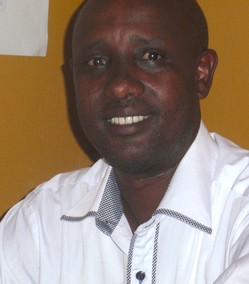Presbyterians have an opportunity this fall to hear firsthand about the aftermath of the 1994 Rwandan genocide and how the country has continued to heal 21 years later. A Presbyterian pastor from Rwanda is among the 10 speakers taking part in the Peacemakers visit to the U.S. beginning in September.
The world was shocked when more than 800,000 Rwandans were slaughtered by perpetrators over a 100-day period in 1994. The attackers came from the ranks of the Rwandan army, government-backed militias and national police. The slaughter grew out of growing opposition between two groups; the Hutus and Tutsis. The assassination of Rwanda’s Hutu president sparked the violence that lasted for more than three months.
The Rev. Jerome Bizimana is president of Remera Presbytery in the Presbyterian Church in Rwanda, pastors a congregation in Remera and serves as chaplain at the Remera Rukoma Secondary School. He has been instrumental in initiating and training a peacemaking group working to heal the wounds of the genocide, including groups composed of genocide perpetrators released from prison and the people whose family members were slaughtered in the attacks.
“The state of mind following the genocide is positively changing. The church and government have worked hard to build a trustworthy community which can accept each other, no matter what happened,” says Jerome. “They all focus on a new Rwanda with new vision and future. The way is still long but we do our best to help people live together peacefully and there are good things to be proud of.”
Jerome has taken his peacemaking work to the western Rwanda border to help address issues of hate and distrust between eastern Congolese and Rwandans.
“Rwandans were destroyed economically, physically, socially and spiritually, but now you can see how people have been restored,” he adds. “Both perpetrators and genocide survivors are living and working together and some have exchanged marriage vows.”
In addition to crippling the economy, the country saw a major rise in HIV infection, including babies born of rape to newly infected mothers. But both church and government leaders have worked to improve conditions for survivors.
“Genocide survivors were supported by both government and churches to heal their inner wounds,” says Jerome. “The presence of pastors, elders and Christians in the prison was regarded as a way to meet genocide perpetrators who had confessed their crimes and reconciled with their victims.”
Jerome credits good leadership for helping people to change their mindset in the aftermath of the attacks. He says more focus is placed on the common goals versus differences as well as looking toward a bright future by learning from the past.
Jerome says the church is unique in helping reconcile people in conflicts, adding that it carries a message of hope and love. The church has encouraged perpetrators to ask for forgiveness and the survivors to forgive through seminars, trainings, workshops and friendly sports activities organized by churches.
“Today, Rwandans can visit Congo and Congolese can visit Rwanda, which was not possible before,” he says. “Students from the Congo and Rwanda exchange schools and learn about each other in a different way.”
-----
Jerome and other participants in the peacemakers’ visit will be traveling across the U.S. from Sept. 25-Oct. 18. For more information, please visit the peacemaker webpage.

